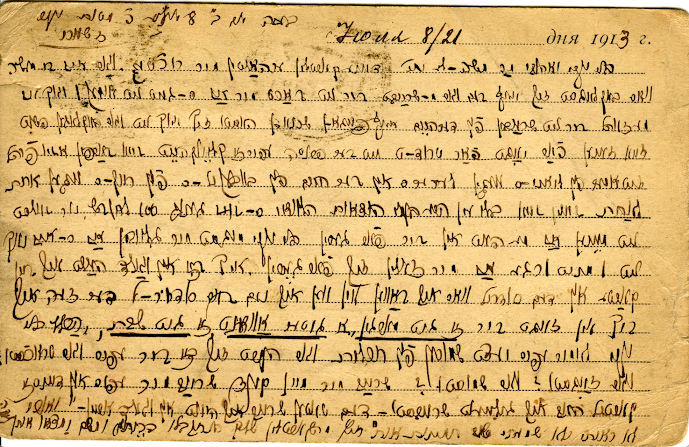Mr. Morris Liderman9 Olsen Place
Lynn - Mass off
Shepard St.
[side 1]
8/21 [2] July [июль], Parshas Matos [3] _____ Zhary [4]
My dear and beloved son Mr. Moshe'le, Should live. We received your cards.
What's the story, why are you complaining that we don't write to you? I think that not a week passes that we don't write from home to you.
You also don't have what to complain about Faiga'n and Shakhna'n, simply because they are busy and overwhelmed with work. You think it's a small issue? They need so much. _____ from _____ [Leon's] about teachers at home, from Zaida'ns (or Baba's), from Reich's, about every single thing _____. Bli Ayin Horah, there are many expenses _____. [5] 100 a month is enough, but you shouldn't think that we have forgotten about you.
My dear son, you are allowed to believe me that not a minute or second pass that we forget about you. Here in the forest, I keep your card in my small Siddur in which I daven [pray] and when I take out th Siddur'l, I see you and tell you good morning, good evening, good Shabbos.
Bottom line, my dear son, let's talk practically. How are things there for you? What are you thinking? What do you say? Who do you talk to? Write to me, my child, write something to me. I read in your card, you write - I am writing to father in the forest today - but I didn't see and didn't hear anything, no photo, or word, except for the cards that you sent to our home and from there, they sent it to me.
[side 2]
You wrote something to Shakhna'n that you are thinking of traveling to Detroit where Michel [?] Bashka's [?] is located.[6] What is your reason for traveling, and what is your goal? Bottom line, write to me, my son. Write to me about everything clearly and precisely.
Your father who wants your good, your happiness and your well being.
_____ _____
Send regards to everyone that I know in you neighborhood. What does Zona Kona'n do there? Send letters from _____ brother-in-law from New York, from Nakhum, from Mottel.[7]
Your father _____.
Notes:
1. It is not clear from which community Levi Yitzkhak mailed the postcard. The Russian letters clearly spell out раево (rayevo). The first letter may have been Г. If so, the town name was Граево (Grayevo). I have not located a community of that name in Kiev Gubernia. We do know that Levi Yitzkhak had been working in the forest near Zhary, west of Baranovka (see note 1 in this post for a location map). To be located in Kiev Gubernia, Levi Yitzkhak would have been more than 100 km east of Baranovka. 2. Levi Yitzkhak wrote the date in both the Julian (in use in Russia) and the Gregorian (in use in the USA and much of the rest of the world) calendars. It was 8 July 1913 in Russia and 21 July 1913 in the USA.
4. Levi Yitzkhak had been working in the Zhary forest in Volhynia Gubernia for over a year (see blog post linked in note 1, above). Why his postcard was mailed from a community well east in Kiev Gubernia is unknown.
5. Bli ayin hora: Yiddish saying used with a positive statement. The concept was to ward off the evil eye.
Faiga (Moshe's older sister) and Shakhna Grinfeld (her husband) had three children: Laya, Wolf (called by the nickname Baba in another post) and Raya (Reich/Reichl). All three were excellent students and attending school or cheder (religious school). That, in itself, would have been costly for a family.
6. By April 1914, Moshe/Morris was on his way to Detroit and remained there for the rest of his life.
7. The brother-in-law in New York was Jacob Simberg, Levi Yitzkhak's wife's brother. Nakhum and Mottel were Nathan and Max Garber, Levi Yitzkhak's brother Avrum's sons who had immigrated in 1910 and 1908, respectively (Nathan and Max were my great uncles).





